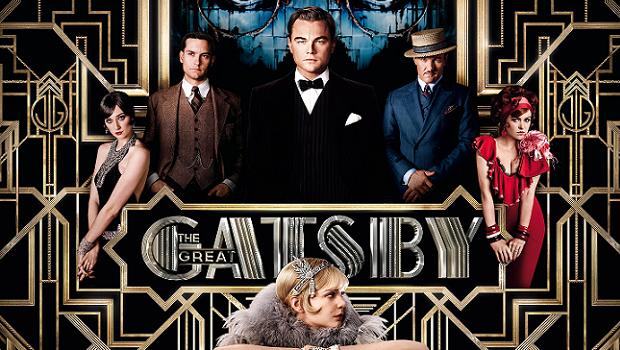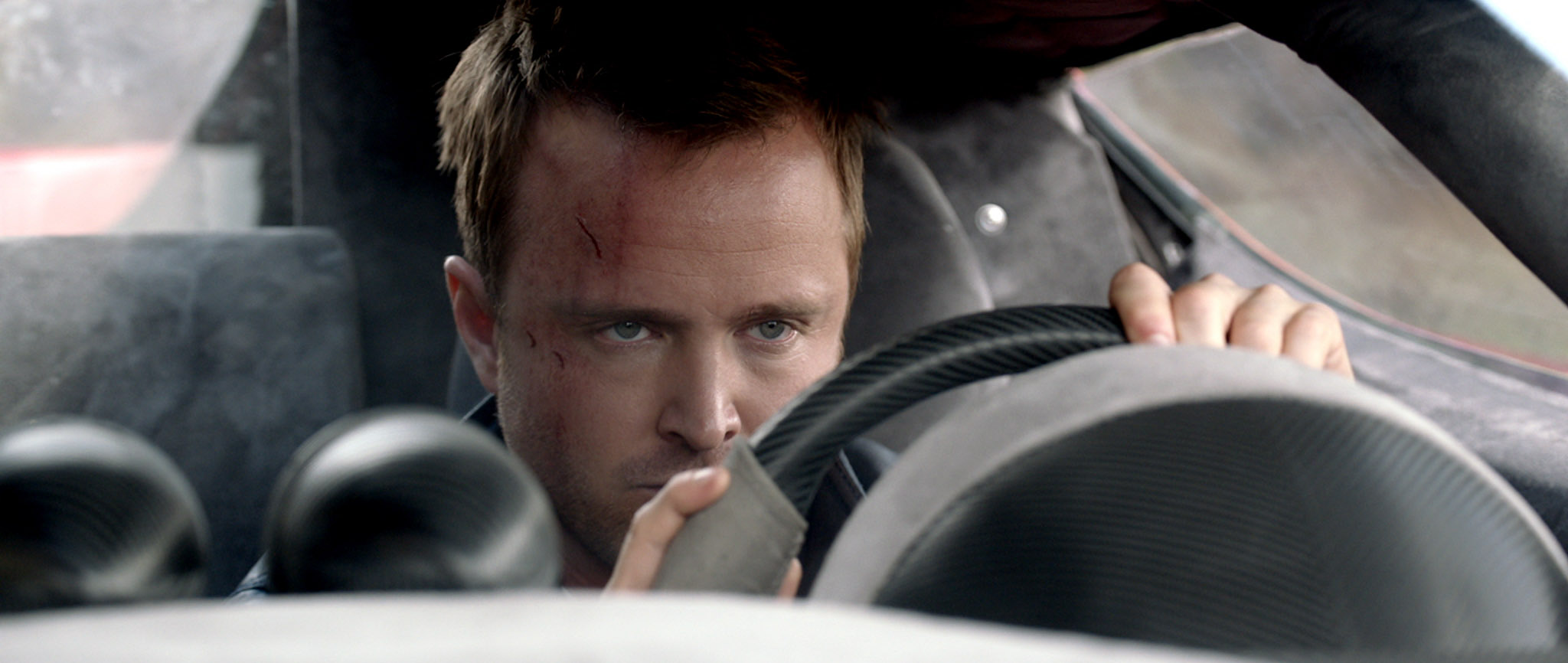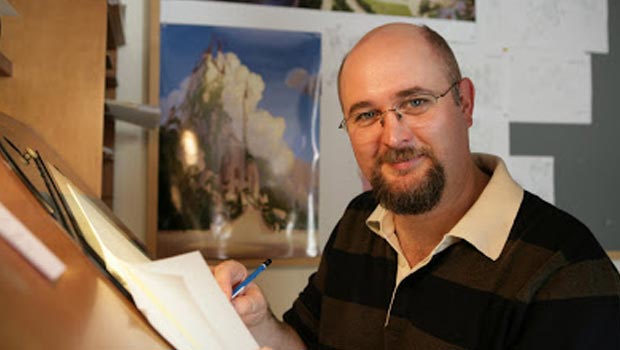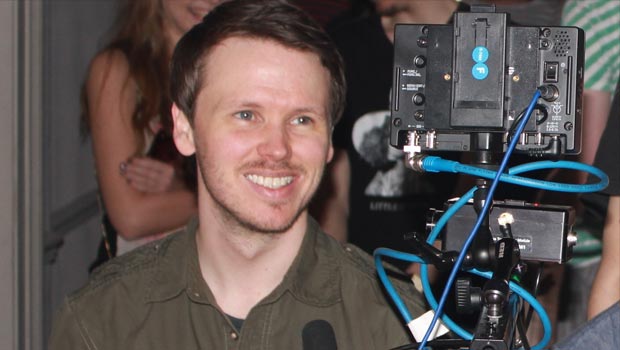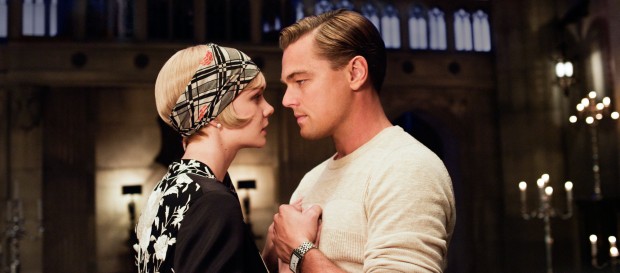Walking down a rainy Regent Street in London Craig Pearce, co-writer of The Great Gatsby picked up his phone and rang me so we could talk about his latest outings, his collaborations with Baz and his new TV programme called Will, which is why he was walking around rainy London. Thankfully, he was eager for a chat to explain the reasoning behind his and Baz Luhrmann‘s interpretation of The Great Gatsby and their translation and adaptation of such an important piece of literature. As well as their bold decision to adapt Gatsby, he’s got the guts to reinvent William Shakespeare himself, who will be appearing on your small screen soon in the US and later on in the UK, as is the way. He’s a screenwriter whose work you are almost certainly familiar with as he’s written Strictly Ballroom, Moulin Rouge!, Romeo + Juliet and The Death and Life of Charlie St. Cloud. Below he openly chats to us. Do enjoy.
This is your fourth collaboration with Baz Luhrmann – Moulin Rouge!, Strictly Ballroom, Romeo + Juliet – what attracts you to working with him?
Working with him is something that just evolved organically. We’ve been friends for a long time, we actually met the second to last year of high school. We were in a production of Guys and Dolls together at Narrabeen High School. It was a pretty sporty school, lots of surfing, football, that kind of thing. I’d only just arrived at the school when we did the play and we both got cast in the lead roles; I played Nathan Detroit and he played Sky Masterson and we both discovered that we were really serious about acting, theatre, films, books, art and literature. We wanted to be actors, we became really good friends quickly and our friendship at the beginning was really about telling stories; trying to make up stupid things, stupid stories to make each other laugh. We talked about books and movies and plays.
We both went to NIDA (National Institute of Dramatic Art), it’s the premiere acting school of Australia where people like Mel Gibson, Judy Davies and Cate Blanchett went. We studied acting together – although we were in separate years. One of the things he did at NIDA was – as part of the curriculum, called Self Devise – where the actors would get to write and stage their own small show. He came up with an idea for a show set in the world of ballroom dancing. It was just a little show that he devised with seven other actors from his year. He had two performances – one in the morning, one in the afternoon – and it was only twenty minutes and it was incredible. Everyone was like ‘wow!’
When he left NIDA he went on to become a director. He hired me as an actor for a theatre company he was in. One of the shows we did was Strictly Ballroom and wanted to expand that into a full-length piece. Me, him and the other people in the company ended up writing the script for the extended play. Producers saw it and asked him to turn it into a movie. He went on a journey with another writer for a year that didn’t work out and ultimately I ended up writing Strictly Ballroom with him. I’d always wanted to be a writer from a very early age as well as an actor so there was an organic nature to it. We found out, when we started working on Strictly Ballroom together, our shared history of telling stories really made for a great collaboration as writers. That’s the history of it! Then of course what attracts me to working with him is obviously he’s an incredibly talented story-teller, writer, filmmaker; he’s quite visionary. Also he’s an incredible leader when he’s actually making the films and we’re essentially making the films when we start writing the screenplay together. On many different levels there are many different things that are wonderful about working with Baz.
Your interpretation of Gatsby is interesting but a lot of people are having problems with it. From the reviews coming out of the States it’s created a bit of a divide. Why did you choose to take Gatsby in the direction you did?
Everything done in the film was intended to communicate the book to a new audience – the audience of today. What Fitzgerald did with Gatsby was he wrote a very pop novel that had references to popular culture all the way through it – songs, people, theatre, fashion, automobiles, stock market. A very important element of the book is that it’s incredibly glamorous, incredibly exciting but ultimately a very shallow world that Daisy and Tom and all of that generation had created – Very consumerist, get rich quick, party hard, don’t think about the consequences world. People look at The Great Gatsby with hindsight and go ‘oh it’s a classic, yadda, yadda, yadda, we have to do it in pastels!’ but… why? The only colour that’s mentioned in The Great Gatsby is yellow… oh and green! There’s a sense of vibrancy and urgency in the book that needs to be communicated anew. We need to feel how it would’ve felt to be in the 1920s at that time. You have to feel it in a visceral way for the story to work.
All the epic elements are a way to communicate anew in a way that an audience today will understand what F. Scott Fitzgerald was trying to portray to his audience. You have to remember that The Great Gatsby was very poorly reviewed when it came out. It’s often said that the critics tend to take a while to catch up because, more often that not, if something is bold they immediately go ‘oh! That’s scary!’ If you go back to read the reviews of Fitzgerald when the book came out they labelled it as a ‘trashy novel’ so people can make up their own minds and that’s OK because everyone has different tastes. The very first thing we did when we started to work on the screenplay was sit down and spend over three months dissecting the book in great, great detail. Reading it again and again and aloud to each other and really trying to understand the book and what was going on with every character in every situation and what he was trying to say. I would say if it divides people that’s OK because you can’t be all things to all people. I know from the screenings that I’ve been to that there is an audience that loves the film who understand what we’re trying to do. More importantly, everything we did was in reverence to that book and to Fitzgerald’s genius; it wasn’t us trying to impose our point of view on the book.
It’s a book that has highly been described about what’s on the page, the lyricism and beauty of the writing more than the characters and the story. You’ve got to take that and make it a more visual outlook. What made you grab it and accept the challenge of taking this to the big screen?
Absolutely. The challenge was to try and take Fitzgerald’s gorgeous prose and translate that into a cinematic language. That is a huge part of the experience of reading the novel. It’s not just about the story. Just the story of The Great Gatsby is probably 50% of what makes the book great, the other 50% is Fitzgerald’s artistry and wizardry with language. We had to find cinematic devices to try and translate that experience into something a cinema audience could enjoy and receive. I think we’d be doing the book a disservice if we concentrated on trying to reproduce the plot. Of course the two things fit like hand in glove: you can’t actually separate them because what the story is and the way the story is told in any medium is inexplicably bound up. They’re just two indivisible parts that make up a whole. You can’t go “well we’re just going to cut this” and throw half of it away to make cinema out of what is great about the literature.
You had a couple of actors in for Tom which eventually became Joel Edgerton’s role. Now you have a cast that most films would dream of. When you’re writing, are you casting in your head or did it come down more to Baz’s choices?
Tom was a hard role to cast. There was an actor who we thought was going to play the role but then they weren’t available because of issues with another project they were working on. But with Leonardo and Tobey, they were involved from practically the inception. They came on a journey with us. They did very early workshops with us and it was a while before they both committed to the project. They’re very fine actors and they make very careful and considered choices about what they do. In the beginning it was like ‘let’s start on a journey together’ and they came in and did workshops and read the script. We discussed in great detail what we were doing and where the script needed to continue to go and improve. Carey Mulligan came on at quite an early point. Even though Tom was a hard role to cast, Joel came on early with us. He did a number of workshops with us before we even started shooting. It was a great way to work because at a certain point it goes from just Baz and I in a room together to an energy and creativity provided by very smart and intelligent actors. That’s always a great help as a screenwriter.
What did Leonardo DiCaprio bring to the role of Gatsby? Did he bring what you wanted from the page to life?
He certainly did. What’s wonderful about Leonardo as an actor is he is always searching for what lies beneath the words on the page. He’s always searching for the depth and the complexity. Gatsby is a very complex character. On the one hand he is the most charming man in the world who throws these incredible parties and drives fabulous cars and wears pink suits and is debonair and suave. When you look beneath that there’s a very dark side to him, a very complex side to him and Gatsby isn’t Gatsby without all those things. Leonardo is an actor who can be the most charming man in the world on the screen but that’s not all. There’s so much more with Leonardo and he’s so eager to plum all the levels of the character. I can’t imagine who would play Gatsby if it wasn’t for Leonardo. In my mind there’s no one else who could have played him. He brings the layers and complexity and the depth that is needed to make the character to work.
All of your work seems to focus on period pieces with the exception of maybe Romeo + Juliet which is a mixture of both old and new. Do you have a fondness for the past which makes you delve into these screenplays?
I don’t necessarily have a fondness for the past but I do love history and I do love what history can tell us about the present. Consider the time [of The Great Gatsby] where people thought the stock market was going to go up and up and up, that there was no limit. Getting rich based on no substance was the most modern, smart thing to do. You didn’t need any rules. You didn’t need any responsibilities. You just got rich. If you look at our recent past with the global financial crisis and how that came about, basically a lot of greedy people speculating on speculating, not enough oversight, not enough regulation, not enough moral responsibilities. People not taking the moral responsibility for their actions. I think it’s an incredibly pertinent look at our present because we’re still experiencing very much so in the UK and in America the consequences of that.
There have been some interesting films set today about the global financial crisis but sometimes you can see things more startling and with more clarity when you look at the present through the lens of the past. Sometimes when you’re in the present, you can’t see the forest and the trees because you’re so close it’s all around. You have to actually step back and get a macro view and you can see things in a very simple, clear way. Setting things in the past – apart from the fact they’re exotic, fascinating, fun worlds – you can see the past more clearly.
As you said, Gatsby is quite a superficial book but that’s relevant today with everyone wanting to get effortlessly rich quickly and what I’d call the MTV generation. You’ve managed to adapt a book that may seem like a period piece but is still so relevant today compared to a lot of modern films.
Exactly and we were very aware of how relevant it is for today when we were adapting it. That was absolutely one of the reasons that it seemed like a good idea to make Gatsby now.
One of the more modern aspects of it is having Jay-Z providing the score. It’s a different but inspired choice to have him do it – much like Daft Punk, M83 and others who are getting in on this scene now. Do you know where that decision came from and how it progressed to that?
While Baz and I were writing the screenplay we talked a lot about music and what the musical language might be. Ultimately, as the filmmaker, that was Baz’s call but when we were writing we would always talk about the music – in all of the screenplays – because music is always a big part of cinematic language. Jazz was kind of like the hip-hop of then. Now we look at jazz like this quaint thing but jazz was a revolutionary form of popular music. It came from African-American cultural roots. Jazz could be quite shocking in the 1920s and it was certainly revolutionary. Again, getting back to how to understand how it felt to live in the 1920s, to be in that culture where really, for the first time, it was cool to be young; the teenager was invited in the ’20s. Before that, everyone just wanted to get old so they could be respected. [laughs] Youth culture was being invented. Fitzgerald actually coined the term ‘The Jazz Age’ and I think hip hop and Jay-Z are associated under the big umbrella of popular music today.
Originally Gatsby had a December release date which looked like it was going to be an awards film but it instead moved to May to be a part of the summer blockbuster scene with the final product also released in 3D. Where did that sudden change come from?
Well, it rained in Australia for literally 6 months! [laughs] If you gather the weather records, it was actually unprecedented and it was biblical. It rained in summer when it shouldn’t have rained and then it just kept on raining and raining and raining! Even though a lot of the film was shot in a studio, a significant part of it was shot on location and it delayed us a lot. Ultimately Baz needed more time to finish the movie and the studio were excited by what they saw, in terms of the footage and where it was up to in its cut. They decided to spend more money on it and they had the confidence to release it as a summer movie.
What are you currently working on? Are there any future screenplays you’re working on and can tell us about?
Baz and I are working on a live theatre musical version of Strictly Ballroom which will be out in Australia in April 2014. Also, I’m in London at the moment, I’ve created a TV show [Will] on 24 year-old Will Shakespeare. It’s looking at theatre as it was then which was like rock’n’roll – a completely revolutionary form of entertainment. It focuses on Will, a 24 year-old guy, living in Stratford in the middle of nowhere with a wife and three kids with this crazy, alcoholic Catholic father – which was like being a terrorist back in those days [laughs] – and says to his wife ‘I’ve got a solution, honey, to all our problems: I’m going to run off to London and become a rock star!’ and she’s like ‘no you’re not, you’re a freaking idiot’ but he has this vision for it, to move to London. It’s about a lot more than Will Shakespeare becoming a writer. It’s about a young man from the wrong side of the social, political, economical side of the tracks who risks everything really to do the most modern of things: create his own destiny. It was actually an incredibly modern time. It was the birth of modernism. For the first time a commoner could become a star, like Marlo, when Marlo would walk down the streets and people would scream lines at him from his plays. It’s not just about working in the theatre, it’s about discovering who you are and living an authentic life that is true to you. It’s about the politics, it’s about a divided soul, it’s about love.
The first season is a 10-part series which is 10 hours in total. Our network is a new one called Pivot, a new cable network channel that is being launched by Participant Media. They’re launching a new cable network in the States and we’re going to be their very first scripted drama. I’m very excited by that because we’re in a golden age of television. There’s so much great writing on shows like Mad Men, Breaking Bad and House of Cards and in the past The Wire – there’s just a tremendous amount of very, very good writing happening in that kind of first class cable television. I’m very excited to work in that space and I’ll have a team of writers. It’s very exciting for me to take a long-form view at storytelling – not that I don’t love movies. It’s a different space to work in and I like variety and I’m eager and excited to be exploring that.
I completely agree with you on the golden age of television because it’s definitely at its peak at the moment. The UK does suffer from television distribution problems for these shows that are usually caught up on and binged on here. Will it be available in the UK?
Yes it will! We’re talking to UK broadcasters at the moment. I can’t say where it will be broadcast yet but it definitely will be. We just have to settle on a broadcaster.
Will you ever look into directing your own screenplays or would you prefer to stick to writing?
I am interested in directing, it’s something I’ve been interested in a long time. I have no illusions on how difficult it is because I’ve been up close and seen the incredible mountain Baz has to climb to make a film. [laughs] I’ve been close enough to the process to be fascinated and excited, and daunted [laughs] but I think that’s a good thing because when I do direct I’ll go in with my eyes open. The short answer is yes! I will look into directing but at the moment I’ve got a full slate with Will. Writing Will, running Will, and writing Strictly Ballroom Live will keep me busy for the next year at least. Beyond that, who knows? If we go to a second season with Will I’ll very probably direct an episode of that.
You wrote a sequel to The Dark Crystal called The Power of the Dark Crystal but is it currently on hold or in limbo or in production?
Yeah, I don’t really know what’s happening with that. It so often takes a long time to get things made. With Will it took me five years to get to this stage. I haven’t really discussed the status of that for a while now but as far as I know it’s on hold but I’m not sure. When I say on hold, it’s actively in development but not sure what stage it’s at.
The Great Gatsby is released in UK cinemas today (May 16) following it’s premiere at the Cannes film festival. Remember to watch your TV schedule to fit in Pivot’s first scripted drama, Will, as that promises to be intriguing and will not shy away from the violence and sexualisation of its time that you may not have been aware of. We’d like to thank Craig for taking time out of his hectic schedule and donating it to us for this insightful interview.
We’ll leave you with the trailer for The Great Gatsby:

